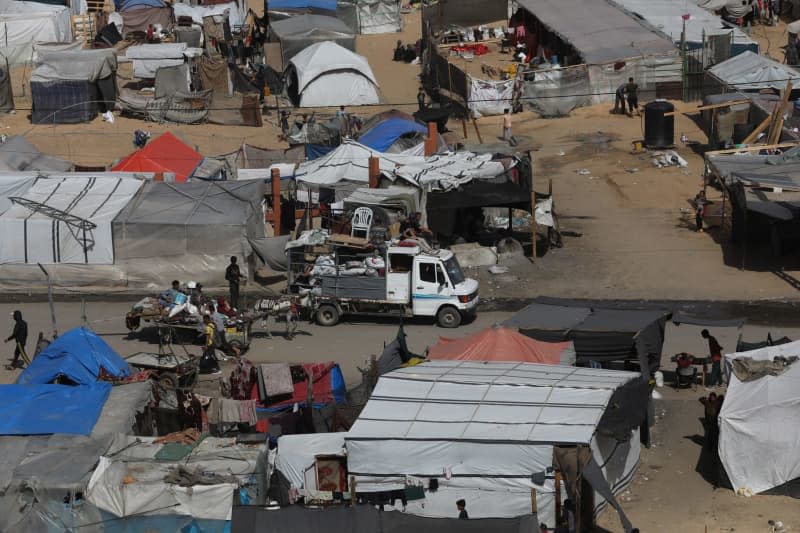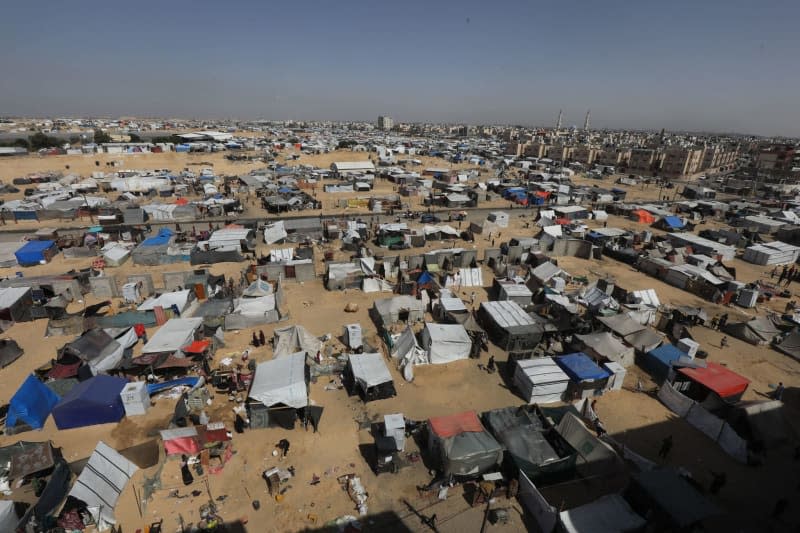Conditions in Rafah deteriorate as 110,000 people flee the city

Conditions in Rafah in the southern Gaza Strip on the border with Egypt have deteriorated as tens of thousands of people flee the city ahead of a potential major offensive by Israeli forces.
"I have been working on large-scale humanitarian emergencies for the best part of the last 30 years and I've never been involved in a situation as devastating, complex or erratic as this," said Hamish Young, UNICEF emergency relief coordinator.
"The current situation in Gaza has reached unprecedented emergency levels," said Georgios Petropoulos, representative of the UN Office for the Coordination of Humanitarian Affairs (OCHA).
Both were in Rafah and spoke to reporters in Geneva via video link.
Five hospitals, 17 primary health care centres, five field hospitals, 10 mobile medical teams and 28 ambulances will have to stop their services within 24 hours if urgently needed new fuel is not delivered, Petropoulos said.
According to Young, more than 100,000 people have left the region within five days following evacuation calls on Monday by Israel, which announced major military operations in Rafah. The roads to the north are congested.
The UN Relief and Works Agency for Palestine Refugees in the Near East (UNRWA) said in a post on the platform X that as many as 110,000 had fled.
The al-Mawasi area near the coast, designated by Israel as a security zone, is completely overcrowded. Families are digging holes in the ground next to their tents to relieve themselves, Young said.
Petropoulos said that practically no relief supplies, especially petrol, had been entering the Gaza Strip via the Rafah and Kerem Shalom border crossings for days.
Without this, the most basic needs of the people can no longer be met, he added. Hospitals, banks, communications companies and drinking water treatment plants need petrol for generators in order to maintain rudimentary services. Waste collection has been partially halted, as has sewage disposal in certain areas.
The aid organization Save the Children spoke of "chaotic scenes" on Friday. The streets were full of cars, people were clinging to lorries, children were crowded onto donkey carts between the last of their families' belongings.
"If you don't have a vehicle, you walk - with everything you can carry," said Rachael Cummings, head of operations for Save the Children in the Gaza Strip. Children were desperately trying to keep up with adults.
"We see barefoot children, no older than 6, struggling to carry water bottles and other supplies," Cummings said, adding that "it really is a very frightening place for children right now."
She said there were children crying and screaming on the roadsides, completely overwhelmed by the panic and chaos they were experiencing.
The Rafah border crossing to Egypt remains closed to humanitarian aid deliveries, according to the Palestinian border authority.
The Israeli army said that troops were still deployed in the east of the city of Rafah and in al-Zeitoun in the centre of the Gaza Strip.
In Rafah, the army had located several tunnel entrances. During battles on the Palestinian side of the Rafah crossing to Egypt, "several terrorist cells were eliminated," it said.
The Israeli Air Force also attacked several areas in Rafah from which rockets and mortar shells had been fired at Israel in recent days.
The military wing of the Palestinian Islamist Hamas movement mounted an attack on the Kerem Shalom border crossing, which serves as an important crossing point for humanitarian aid into the blockaded coastal strip, the fourth such attack since Sunday.
Mortars were used in Friday's attack, the al-Qassam Brigades said on the Telegram messaging service.
Over recent days, Israeli protesters have blocked aid convoys seeking to enter the Gaza Strip, saying that the deliveries are aiding Hamas in resisting Israeli forces.
More than 1 million internally displaced people are said to be living in Rafah.
Israel's Western partners, above all the United States, have urgently warned the Israeli government against a large-scale military operation in Rafah due to the expected dramatic humanitarian consequences.
Following the massacres in Israel on October 7, Israel wants to completely destroy Hamas, whose leaders it suspects are hiding in tunnels under Rafah, where Israeli hostages are presumably also being held.
Meanwhile, the Israeli army has been training for the possibility of a major war with its northern neighbour Lebanon, the military announced on Friday.
It said reservists from a brigade had held various exercises over the course of the week to "accelerate readiness for an operation in this arena."
The aim was operational readiness and preparation "for various combat scenarios in the north."
The training held in Galilee in the north of the country simulated combat situations in Lebanon.
For more than seven months, fierce fighting has repeatedly broken out in the border area between Israel and Lebanon. The pro-Iranian Shiite militia Hezbollah in particular has been firing rockets, artillery and anti-tank shells at northern Israel.


